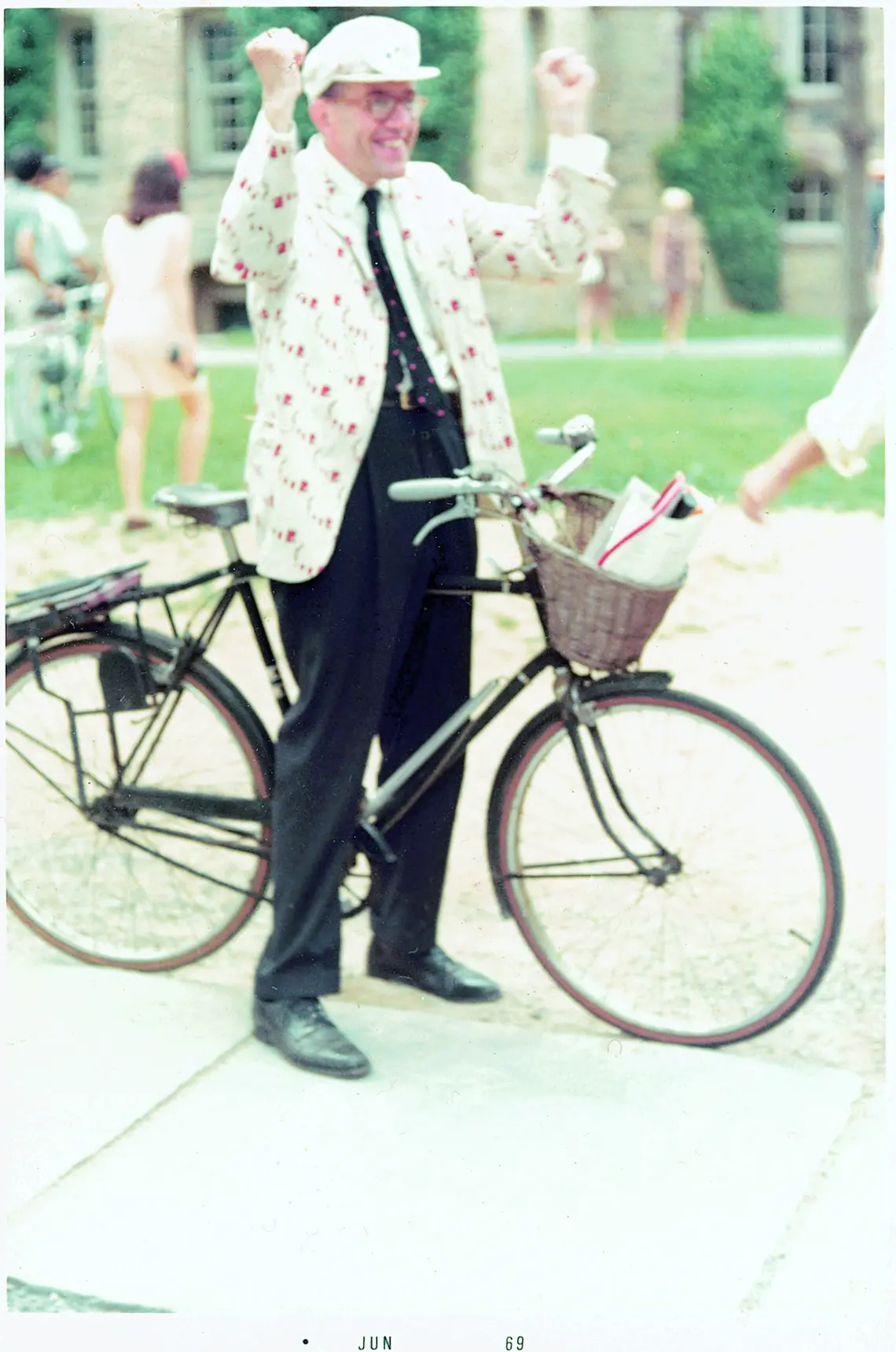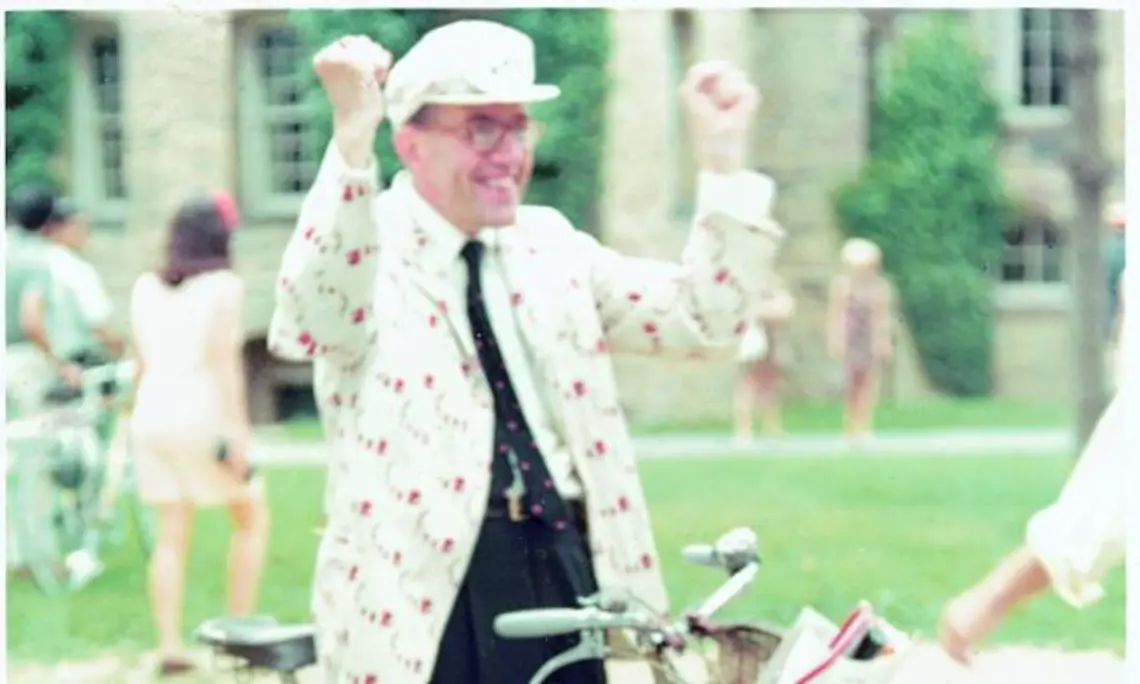

A Tiger, Through and Through: Donald H. Fox k’39 on his Father, Frederic Fox ’39
PAW Tracks
As a son of Freddy Fox ’39, one of Princeton’s most enthusiastic ambassadors, Donald Fox grew up with a reunion tent in his backyard. The younger Fox reflects on his father’s love of Princeton and his path in the 25 years between graduation and his eventual return to work on campus as the University’s recording secretary and later the “keeper of Princetoniana.”
“He was authentic,” Donald says. “My father wasn’t sentimental. He didn’t always talk about what he did [at Princeton], how things were. He could make that transferal, which is an interesting one, of saying, ‘Princeton is now filled with different people who are having different kinds of fun and experiences than I had.’”
PAW podcasts are also available on iTunes — click here to subscribe
TRANSCRIPT
Brett Tomlinson: As a child growing up in Princeton, Donald Fox remembers celebrated Reunions in his backyard — literally. Fox is a son of the late Frederic Fox ’39, who was one of the University’s great ambassadors, and with the exception of major-reunion years, his father’s classmates would gather at their home, one block north of Nassau Street.
Donald Fox: Starting in 1966, we had an orange-and-black tent with ’39s on it that completely filled up our backyard, which extended along Spring Street.
It was — and I’m 65 years old, I think about it now — it was a combination of a huge, extended football weekend, and then something like street theater, with these people dressed up in costume. You know, I pause, and Reunions are somewhat the same now.
BT: That Fred Fox could host a great Princeton party shouldn’t surprise anyone. As President William Bowen *58 said at Fox’s memorial service in 1981, “Fred was unfailingly colorful, and two particular colors were of course his favorites.” But Fox’s life story was written in more than just orange and black.
DF: His role at the University, for the first 12 years, he had this official role called the recording secretary, which means he thanked everybody who gave money or gave a gift to Princeton, under his signature. And then he got literally kicked upstairs, kicked into Nassau Hall, and was keeper of Princetoniana, from 1976 to his death in 1981.
And I’m my father’s biographer, or at least I put together his life in letters. He boasted that people said, “Oh, Freddy Fox, he’s Mr. Princeton, he never left the place.” It’s like he hasn’t grown up. But he would correct that right away and say, “I was away for 25 years.”
He graduated and then went with his closest classmate, Jamie Clarke ’39, and they bicycled and took trains in England, France, Germany, and Switzerland in the summer of 1939. They luckily got back before the war broke out. And then my father, whose older brother [Kelvin] graduated from Princeton in 1935, and was an aide to the governor of Arizona, my father went out [to Arizona]. His brother had the idea that he should write a book about the Babbitt family of Arizona. My father never finished the biography of the Babbitts. He was in a play in the Phoenix, essentially community theater, and he said I want to try to be an actor. And he went to Hollywood for a year and a half. The only job he could get was with NBC Radio. He edited a newsletter there. And then, like zillions of other people, his life was changed by the war.
So he flew back to the East Coast, enlisted, and then he got into this unit that was an Army deception unit that fooled the Germans. Essentially he got to be an actor during the war. But he had a religious conversion, an adult religious experience, in Normandy when he saw his first dead German soldiers. And, it wasn’t the skies opening, but he said life had to be better than this. People have to treat each other as brothers, even if they’re enemies.
He got married in July 1945. And one of the reasons we know so much about what he did during the war is that he wrote his fiancée, my mother, every week.
So he went to Union Theological Seminary from ’45 to ’48, and he said he wanted to learn about small-town America, so he took a job in the center of Ohio. He was minister of a congregational church there for five full years. Then he went to Williamstown, Mass., and I love doing the line — my father got to get up in the pulpit on Sunday and say, “I’m sorry, I’m leaving you as your pastor. I have a higher call.” He said, “I’ve been asked to work in the White House.”
He worked in the White House from the summer of ’56 to literally Jan. 20, 1961, and he spent the last night of his job sleeping at his desk. He spent the one night in the White House so he could say he did that. And then he had three interesting years of creative unemployment.
But I have a letter somewhere where my father said, “I met [President] Bob Goheen [’40 *48], and he, Goheen, turned to his [administrative assistant] and said, ‘Get Fred Fox a job in Princeton.’” It was the beginning of the capital campaign in 1963-64.
BT: Correspondence was, and is, one of the key responsibilities of the recording secretary. Fred Fox wrote thousands of letters in his lifetime, both at work and in his personal life, and Donald Fox has transcribed and compiled about 500 of them in a two-volume biography-in-letters, titled The Old Familiar Places.
DF: I remember asking my mother why my father didn’t like vacations more, and the answer was he missed answering letters. He got out of the give and take and the rhythm of it.
My father was an old-fashioned letter writer. He was personal. He was creative. And he was devoted to, he called it “the cause.” But the word I want to use for my father is that he was authentic. My father wasn’t sentimental. He didn’t always talk about what he did [at Princeton], how things were. He could make that transferal, which is an interesting one, of saying, “Princeton is now filled with different people who are having different kinds of fun and experiences than I had.”
My father wasn’t a key person — he didn’t make the decisions — but I like to boast that he was worth a million dollars to Princeton when Princeton made the decision to go co-ed. He was there saying, “It’s still a great place.” He did help bridge the old Princeton and the new Princeton, and to explain how he did it, that’s too hard for me. It just pleases me that people tell stories in the oral history of Princeton and Freddy Fox’s name comes up. He was able to impart to these new students the sense — it’s not instant loyalty, but saying that this is a place worth being loyal to.
He would tell people, “I hope you have a job that you love as much as I love my job.”
BT: Our thanks to Donald Fox for sharing his memories of his father. Brett Tomlinson produced this episode. The music is licensed from FirstCom Music.
Each year at Reunions, the Princeton University Band honors the legacy of Fred Fox, one of its most devoted supporters, in a concert of Princeton songs on Cannon Green.
Paw in print

February 2026
Lives Lived & Lost in 2025, Saying ’yes’ to more housing; AI startup stars


No responses yet